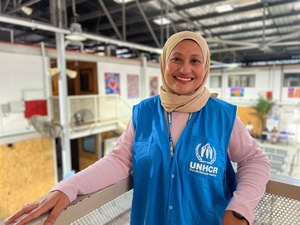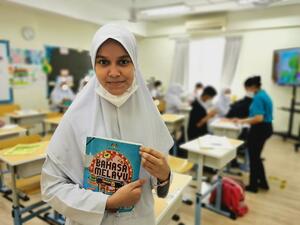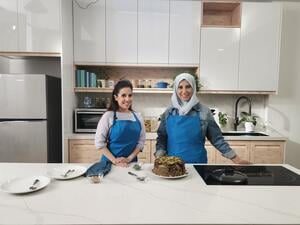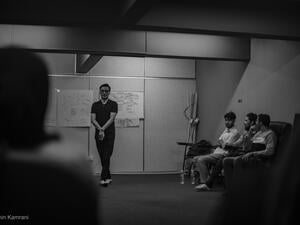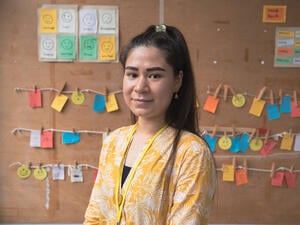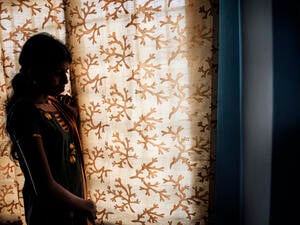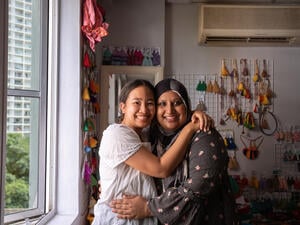Living With Courage
Living With Courage

Education gave me my biggest strength – my confidence and ability to communicate. Education helped me survive
Living as a refugee, though the odds were seemingly stacked against her, Hasna faced the world bravely.
The Rohingya refugee’s life stories are a litany of hardships and disappointments, but she narrates them more with defiance than self-pity. Her fortitude was honed from young, as soon as she stepped into the outside world.
Hasna was born in Malaysia to parents who had fled the persecution in their homeland, long before the word Rohingya hit the headlines.
Malaysian children would only call her “Burma”, labelling her and rendering her nameless.
“In the beginning, I was angry. I have a name and I want people to call me by my name. My mum and dad had chosen a simple but meaningful name for me. It means laughter. My parents say I bring laughter into their lives, and so they called me Hasna,” recalled Hasna, who is now 29 and has a daughter.
Refugee children in Malaysia are unable to access formal education due to their lack of legal status. However, out of humanitarian reasons, the headmaster of a local school allowed her to attend classes when she was 11 years old.
“At school, it was so painful when people started calling me Burma, even the teachers,” said Hasna.
Hasna was always the toughest child at home, and felt ashamed of crying. But her mother said tears were not a sign of weakness. Hasna wanted to hide and be invisible, but her mother told her that wouldn’t earn any respect.
So, the young teen continued going to school, understanding too that education was a privilege not to be taken for granted. Her parents were determined to educate her, and they had high expectations of her.
“When I was younger, they could not afford school for me. But they didn’t give up. My mother went from house to house in our neighbourhood until she found a tutor for me before I got into school,” shared Hasna, who is as articulate in English as she is in Malay.
She studied hard but it was in sports that Hasna excelled in.
“I was good in all kinds of sports. By the time I was in Form 2, I was winning all the sports events, and the teachers would call out my name to give me the prizes. That’s how I got my name back,” said Hasna.
But her lack of legal status eventually caught up with her, and she was asked to leave when she could not sit for the national qualifying examinations.
“I was sad I couldn’t study any more. Unlike other kids, I’d always been sure of my ambition. I wanted to be an engineer. But we couldn’t afford the fees at private colleges,” shared Hasna who had started working part-time at a car workshop when she was 15 because she was interested in the mechanics of how things work. She started out changing tires and eventually learnt to fix engines.
But as heartbroken as Hasna was, she couldn’t wallow in pity as she needed to help her family. So she put her dreams of studying on hold, and in spite of her lack of legal status, found work wherever she could to help make ends meet and to keep building her skills.
“I have always worked, from the time I was in school, so I have many skill sets. I worked at a telecommunications company for a while, then I worked as an interpreter for UNHCR for six years,” said Hasna.
Hasna also worked as a research assistant with an NGO working in domestic violence. Her job included conducting trainings with refugee women on sexual and gender-based violence.
Today, Hasna is one of the few fortunate refugees globally to be provided a permanent home in a third country with her family
Reflecting on her life, Hasna believes her schooling helped her survive. Being educated gave Hasna her biggest strength - the confidence and ability to communicate well. Dealing with discrimination from young has taught her to not speak her mind for she isn’t afraid of people’s opinions of her.
In spite of all she went through, at every point of her life, Hasna refused to be dejected.
“Everyone has different challenges, but everyone is an open book. I am more than positive about my life. I want to know what else I can do, how much more I can go through and how many more challenges I can go through,” she declares, strong and ready to fight.
*Hasna and her family were resettled to a third country late 2020. This interview was conducted before she left Malaysia and updated to reflect her current status.


